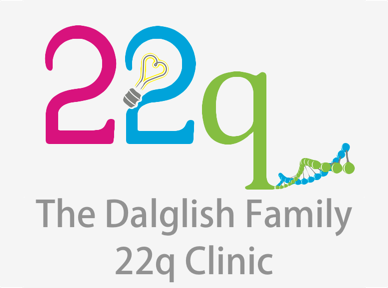Sleep Health
Sleep hygiene
Please see our info sheet on How to Sleep Better.
Sleep Apnea
Sleep apnea is an illness in which a person stops breathing many times when sleeping. Here, we will talk about obstructive sleep apnea, which is the more common type of sleep apnea in 22q.
Symptoms of sleep apnea
These symptoms can be signs of sleep apnea:
- Feeling tired even after sleeping
- Waking up often due to choking or gasping
- Others say that you snore loudly or stop breathing when you sleep
- Difficulty staying asleep
- Morning headaches
- Daytime sleepiness
- Poor concentration
- Easily irritable (feeling grouchy)
How does sleep apnea happen?
- Sleep apnea happens when certain muscles in your throat relax and narrow your airway.
- Then you cannot get enough air, and the oxygen level in your blood goes down.
- Your brain briefly wakes you up to breathe, but you do not remember this.
- You keep waking up to breathe, and you don’t sleep well.
What can increase the risk of sleep apnea?
- Excess weight
- Smoking
- Men
- Women after menopause
- Older age
- Others in the family have obstructive sleep apnea
- Nasal congestion
- A narrowed airway
Complications of sleep apnea
You should not ignore sleep apnea. It can lead to complications including:
- Feeling very tired, drowsy, and irritable
- Increased risk for accidents
- Less able to do well at school or work, even some behaviour problems
- Increased risk of heart problems like high blood pressure, heart attack, stroke
Diagnosis: Sleep study
Ask your doctor if you think you may have sleep apnea.
A sleep study is often helpful. While you sleep, your heart, lungs, brain, movements, and oxygen levels are checked. This makes it possible to “see” if there is sleep apnea and how severe it is.
Treatment for sleep apnea: Using the CPAP
A little CPAP (Continuous positive airway pressure) machine can help you keep your airways open. This decreases snoring, the number of times you stop breathing, and related problems.
CPAP is the most reliable way to treat sleep apnea. And treating sleep apnea is very important for your overall health.
Many of our patients report improved mood when they use their CPAP regularly!
Losing weight and quitting smoking also help.
More info about sleep apnea and CPAP
- In the Canadian Medical Association Journal: Diagnosis and treatment of obstructive sleep apnea in adults
- Appendix 2 lists potential solutions for problems using CPAP.
- The Sleep apnea webpage from the Mayo Clinic is also helpful
- Ontario’s Assistive Device Program may cover part of the cost of your CPAP system. Please visit the Government of Ontario’s Respiratory equipment and supplies page for more information.
